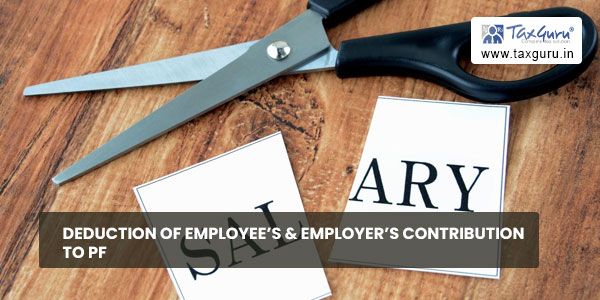Deduction, disallowance and reallowance of Employee’s and Employer’s contribution to PF under the Income Tax Act, 1961
According to the provisions of provident act of India, there is requirement of contribution to the provident fund on part of both the Employer and Employee. Both contributes at equal rates.
The Employer deducts an amount from salary of an Employee and he himself additionally contributes and deposits the same.
In hands of Assessee-Employer, the allowance in respect of contribution to provident fund, deduction is allowed provided the section 36(1)(va) of the Income Tax Act,1961 (“Act”).
As per the Income Tax Act, 1961, deduction in respect of both Employer’s contribution and Employee’s contribution to PF are allowed to the Employer from his income under PGBP Provided the Employer had deposited the same within due date.
If the amounts were not paid within due dates prescribed under the act, it will leads to the disallowance under income tax act. The disallowance in respect of both contributions governed by the different provisions of the Act which is as under :
– Employer’s contribution to PF: The Employer’s contribution to PF is a genuine expenditure incurred by the Employers for the Employees. Thus, it is considered as business expenditure and allowed as deduction under the head PGBP. Section 43B of the Act governs the provisions regarding disallowance of statutory expenses incurred by the Assessee if the same is not paid within the due date of filing return of income. Further, the same will be allowed in the year in which it is being paid. The Clause (b) of section 43B of the Act prescribes the provisions regarding Employer’s contribution to PF.
This means that if an Employer’s contribution to PF is not paid within due of filing return of income the same will be disallowed U/s 43B of the Act. Further, if paid in subsequent year, the deduction will be reallowed in subsequent year on actual payment basis.

– Employee’s contribution to PF: In regards with Employee’s contributions to PF, the amount of contribution is being deducted by the Employer from salary of Employee.
– Section 2(24)(x) of the Act states that income includes the amount received as Employee contribution to PF. Thus, the Employees contribution to PF collected by the Employers first being treated as income of the Employer and thereafter allowed as deduction U/s 36(1)(va) of the Act. The provision of section 36(1)(va) of the Act prescribes that deduction will be allowed if the Employee’s contribution is being paid before the due date as prescribed under the Provident Fund Act. Thus, in view of the above, it is clear that in regard to the Employee’s contribution to PF, section mandates that in order to claim deduction for Employee’s contribution to PF, it has to be deposited before the due date as per PF law. Unlikely the provisions of section 43B of the Act, this section is not giving benefit of reallowance of Employee’s contribution to PF on actual payment basis. If there is delay in payment of contribution even by single day, the assessee has to foregone the deduction of Employee’s contribution. Even if it is being paid after due date the deduction cannot be allowed.
– The above discussion is summarized as under:
| Sr. No. | Particulars | Employee’s Contribution |
Employer’s Contribution |
| 1. | Firstly considered as income | Yes, as per section 2(24)(x) Employee contribution to PF is firstly treated as income of the Employer and then he gets deduction after the payment made. | NA |
| 2. | Deduction allowed U/s | Section 36(1)(va) | Allowed as general business expenditure U/s 36 |
| 3. | Due date for purpose of claiming deduction | Explanation 1 to section 36(1)(va) clearly mentioned due date as per PF Act |
For disallowance, section 43B attracts thus as per it due date means date of filing return of income. |
| 4. | Section governing disallowance of deduction | Section 36(1)(va) | Section 43B |
| 5. | Reallowance of deduction in subsequent period of actual payment | Not available (Explanation 5 to section 43B clearly excludes Employees contribution to PF) and further section 36(1)(va) does not contains the provision regarding the re- allowance. |
Available U/s 43B, which means amount disallowed in current AY shal be allowed in subsequent AY on actual payment basis. |
– Thus, in view of above it is clear that the provisions for the Employer’s contribution to PF and Employee’s contribution to PF are differently deals under income tax law.






Can deduct both the employee and employer contributions from employee salary for Provident fund
Can deduct both the employer and employee contribution from the employee salary for P F?
An employee whose actual basic pay is Rs.35000/- pm, but his PF is being deducted on 15000/- i.e. Rs.1800/- pm according to the proportion of number of payable days. He absented for 16 days during the month of Nov, and his PF was deducted as per the calculation 15000/30*14 = 840/-.
Due to employee absent his salary will be reduce as per absent but what amount should be deducted in ceiling PF contribution
I am a salaried individual and both the employer’s contribution and the employee contribution to pf has been added under taxable income and then provided as a deduction under 80C for employee contribution, however, employer’s contribution to pf be exempted under some section of IT act. Please let me know the section under which employer’s contribution to pf be claimed.
Can the employer deduct the employer pf contribution amount from the employee’s salary
query-PF contribution…I have VPF voluntary PF contribution 20% .whether the employer contribution (equal )for the VPF ..also I have contribution of 10%.what will be employer contribution…10,%plus 20%.?,or ..
Hi,
I am a salaried individual and both the employer’s contribution and the employee contribution to pf has been added under taxable income and then provided as a deduction under 80C, however, shouldn’t the employer’s contribution to pf be exempt and not added to my taxable in the first place?
Appreciate your time and assistance in advance!
Thanks
What is the due date we considering in case of the employer contribution to ESI.
Hello Maneesha!, as duly mentioned in my above article, the due date for Employers Contribution is due date of furnishing return of income.
Very Useful article
Thanks Pradeep! keep following.🙏😊